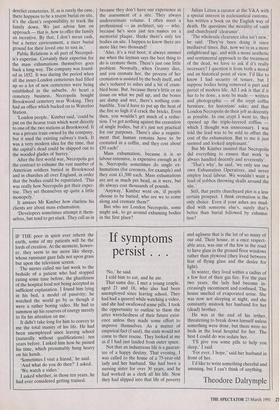If symptoms
persis • t • • IF THE poor in spirit ever inherit the earth, some of my patients will be the lords of creation. At the moment, howev- er, they seem to me more like sheep, whose ruminant gaze falls not upon grass but upon the television screen, The nurses called me last week to the bedside of a patient who had stopped eating some time before, the ghastliness of the hospital food not being accepted as sufficient explanation. I found him lying in his bed, a model of passivity; he watched the world go by as though it were a rather boring video. He had to summon up his reserves of energy merely to fix his attention on me.
It didn't take long for him to convey to me the total inanity of his life. He had been unemployed since leaving school (naturally without qualifications) ten years before. I asked him how he passed his time, which presumably hung heavy on his hands.
'Sometimes I visit a friend,' he said.
'And what do you do then?' I asked.
'We watch a video.'
I asked whether, in those ten years, he had ever considered getting trained, 'No,' he said.
I told him to eat, and he ate.
That same day, I met a young couple, aged 21 and 18, who also had been unemployed since leaving school. They had had a quarrel while watching a video, and she had swallowed some pills. I took the opportunity to outline to them the utter wretchedness of their future exist- ence unless they made some effort to improve themselves. As a matter of empirical fact (I said), the state would not come to their rescue. They looked at me as if I had just landed from outer space.
Not that an industrious life is a guaran- tee of a happy destiny. That evening, I was called to the home of a 75-year-old lady and her husband. She had been a nursing sister for over 30 years, and he had worked as a clerk all his life. Now they had slipped into that life of poverty and ugliness that is the lot of so many of our old. Their house, in a once respect- able area, was one of the few in the road to have glass in the ground floor windows rather than plywood (they lived between fear of flying glass and the desire for light).
In winter, they lived within a radius of a few feet of their gas fire. For the past two years, the lady had become in- creasingly incontinent and confused. The house smelled of evaporated urine. She was now not sleeping at night, and she constantly mistook her husband for her (dead) brother.
He was at the end of his tether, threatening to break down himself unless something were done, but there were no beds in the local hospital for her. The best I could do was sedate her.
'I'll give you some pills to help you sleep,' I said.
'For ever, I hope,' said her husband in front of her.
I'd like to write something cheerful and amusing, but I can't think of anything.
Theodore Dalrymple


























































 Previous page
Previous page